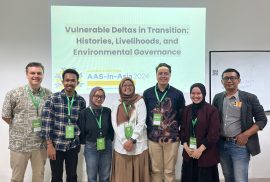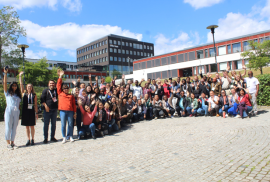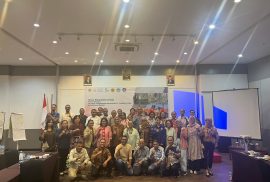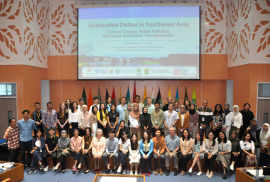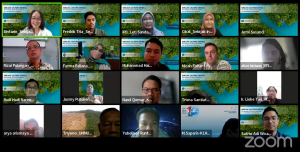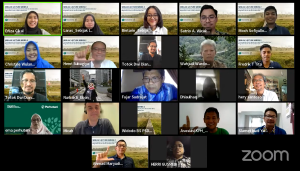Sebijak Institute Faculty of Forestry UGM, Forest and Society Research Group of Hassanudin University, and East West Center participated in the Association for Asian Studies (AAS)-in-Asia Conference with the panel theme discussion “Vulnerable Deltas in Transition: Histories, Livehoods, and Environmental Governance” on July 11, 2024. The panel was based on a collaborative project
Dr. Dwi Laraswati – a researcher from Sebijak Institute, Faculty of Forestry UGM has been granted full sponsorship from the International Union of Forest Research Organizations (IUFRO) to attend the 26th IUFRO World Congress 2024. This prestigious event encompasses the Pre-Congress Training Workshop (PCTW) and the main conference. The training took place on June 19-22, 2024 at the Swedish
The KONEKSI research team successfully executed the second provincial-level research results dissemination and policy dialogue. This activity was carried out on 4 June 2024, hybridly, at the Environment and Forestry Serviceof West Nusa Tenggara (Dinas Lingkungan Hidup dan Kehutanan Provinsi Nusa Tenggara Barat) and through the zoom meeting platform. The title of this second dissemination
The impact of climate change is being felt by vulnerable communities on small islands in eastern Indonesia, including rising sea levels, extreme weather, droughts, floods, landslides, and other natural disasters that affect their livelihoods. To address these issues, agroforestry systems are one strategy that has been proven to enhance the socio-ecological resilience of communities in mitigating the impacts of climate change. However, the integration of gender aspects
Ungirwalu, A., Mansoben, J. R., Runtuboi, Y. Y., Fatem, S. M., Peday, M. H., Marwa, J., & Maryudi, A. (2025). The fall of the kings: Power relations and dynamics in Papua’s indigenous community in forest resource management. Forest Policy and Economics, 172, 103424. https://doi.org/10.1016/J.FORPOL.2025.103424
Abstract
Tribal leaders in Papua had been positioned as both cultural symbols and real decision-making leaders, but they have lost their power over natural resource management and forests. Using the case of nutmeg management by the tribal Baham-Matta community, we present changes in the power constellations within the local social structures, in which the Kings (Patuans), the highest tribal leaders, have increasingly been unable to rule their people. In this research, we mainly employed the theoretical
Daulay, M. H., Soraya, E., Ha, T. T. T., Laraswati, D., Susanti, F. D., Sahide, M. A. K., & Maryudi, A. (2024). Implementation of Timber Legality Assurance and Licensing Systems in Vietnam: A SWOT-AHP Analysis. Journal of Sustainable Forestry, 43(1–5), 54–70. https://doi.org/10.1080/10549811.2024.2439618
Abstract
The European Union (EU) established cooperation with timber exporting countries to fight illegal logging through the Forest Law Enforcement, Governance and Trade (FLEGT) Action Plan. FLEGT has gained increasing interest from several countries, including Vietnam, which has signed a bilateral Voluntary Partnership Agreement (VPA) with the EU. Central to the VPA is the implementation of a timber legality assurance system (TLAS) that ensures that only legal products are exported to the EU.
Daulay, M. H., Susanti, F. D., Laraswati, D., Arthalina, E. C., & Maryudi, A. (2023). New land governance models and management scenarios: Fitting Forest Management Units (FMUs) for forested landscapes outside forest zones in Indonesia. Forest and Society, 7(1), 43–60. https://doi.org/10.24259/fs.v7i1.23962
Abstract
Many parts of non-forest zones (Areal untuk Penggunaaan Lain/APL) in Indonesia are forested but are however under intense pressure from unsustainable practices and conversion. To help preserve forested APL zones, the Ministry of Environment of Forestry is envisioning the integration of forested APL areas into the operational activities of the Forest Management Units/ FMUs (Kesatuan Pengelolaan Hutan/KPH), a management arm of the forest administration. Under the current governance arrangements,
Sebijak Institute of Universitas Gadjah Mada in collaboration with the Center of History and Culture of Borneo (CE-HERO) Mulawarman University held an International Workshop entitled “Vulnerable Deltas In Southeast Asia: Climate Change, Water Pollution, and Socio-Economic Transformation”. The workshop is a series of collaborative multi-country projects as a discourse initiative on social, economic, and climate crisis issues in the Southeast Asian delta
Since the late 1990s Reformation era, Indonesia’s forest governance has served as a pivotal element of its environmental strategy, emphasizing efforts to combat deforestation, restore degraded landscapes, and promote the active involvement of local communities in sustainable management practices. While Indonesia has made significant strides in improving forest governance, there are still challenges such as regulatory overlaps, ambiguous legal definitions,
Daulay, M. H., Soraya, E., & Maryudi, A. The Competitiveness of the Indonesian Furniture Industry in Global Trade: A Comparative Study with Vietnam. Jurnal Ilmu Kehutanan, 16(2), 152-158.
Abstract
Furniture products with significant added value are strategic commodities for the Indonesian economy. Therefore, this research aimed to determine the competitiveness of the Indonesian furniture industry in terms of marketing by making a comparison with Vietnam due to being one of Indonesia’s main competitors in the furniture trade for decades. This research employed a literature study to collect data and an integrated comparative analysis using the 5P mixed market framework of position,

